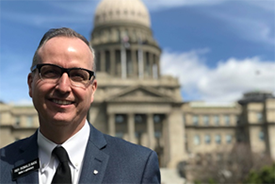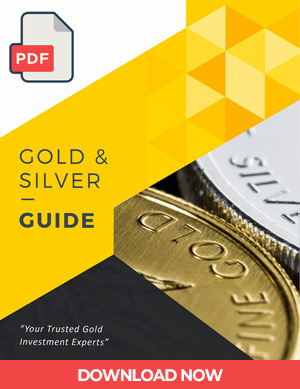The recent explosion in inflation rates caused by runaway debt-funded federal spending and Fed money printing has sparked renewed interest in state legislatures in the role gold and silver play in hedging against systemic risks.
 Bullion.Directory precious metals analysis 08 February, 2022
Bullion.Directory precious metals analysis 08 February, 2022
By Stefan Gleason
President of Money Metals Exchange
With expanding concerns about financial leverage, debt defaults, volatility, and an erosion in purchasing power of the Federal Reserve Note “dollar,” Ohio, Arkansas, West Virginia, Wyoming, Louisiana, and Arizona recently joined dozens of other states in removing tax penalties on buying, selling, and holding gold and silver.
Meanwhile, several states are considering an allocation of state funds to the monetary metals – a way to hedge their investments in fixed income and other assets vulnerable to inflation.
Ohio recently followed Texas in making a 3-5% gold allocation in its public pensions, and New Hampshire, Oklahoma, Wyoming, and Idaho are examining legislation right now to empower state treasurers to hold gold and silver as reserve assets.
By way of example, the state treasurers in both Oklahoma and Idaho each have $10 billion in taxpayer funds under management – the value of which is rapidly bleeding away through negative real interest rates.
That’s because these two states – like most states – have invested almost exclusively in low-interest debt paper, e.g., U.S. Treasuries, money market funds, corporate debt, repurchase agreements, and other dollar-denominated debt.
Substantial debt-paper holdings carry both counterparty risk and low nominal yields. With inflation now running at 7% (at least), the real rate of return for taxpayers is deeply negative, perhaps greater than 5% negative.
A reserve fund with the objective of maintaining the value of principal ought to include an allocation to the money actually prescribed to the States in Article 1, Section 10 of the U.S. Constitution, i.e. gold and silver.
The monetary metals help preserve purchasing power over the medium to longer term and have a low correlation to other assets, providing important diversification and financial insurance.
Gold and silver are liquid, traded around the clock at full market value, and don’t suffer from negative interest rates.
The financial security precious metals provide is part of the reason central banks around the world hold them on their balance sheets (with Russia, China, Germany, France, Hungary, Serbia, Thailand all known to have bolstered their holdings in recent months).
Idaho House Bill 522 (introduced by Rep. Ron Nate, who holds a doctorate in economics) and Oklahoma House Bill 3681 (introduced by Rep. Sean Roberts) would permit — but not require — the treasurer to hold a portion of funds in the monetary metals to hedge against the risks of inflation, financial turmoil, and debt default while potentially securing capital gains.

Rep. Ron Nate of Idaho is a
leader on the sound money issue.
That’s why both the Idaho and Oklahoma bills do not empower treasurers to invest in electronic instruments, futures contracts, or other gold and silver derivatives. The authority is confined to physical gold and silver, directly owned by the state, insured, unencumbered, and stored in secure bailment.
It’s as prudent as ever to provide state treasurers with options to hedge against the accelerating inflation that’s been foisted upon savers, wage-earners, retirees, and the states themselves by short-sighted politicians and central bankers in Washington, D.C.
States are likely to pay a high price if they fail to diversify into gold and silver. Inflation is the match that threatens to set the states’ big piles of negative-yielding debt paper on fire.
Stefan Gleason


Stefan Gleason is President of Money Metals Exchange, a precious metals dealer recently named “Best in the USA” by an independent global ratings group.
A graduate of the University of Florida, Gleason is a seasoned business leader, investor, political strategist, and grassroots activist. Gleason has frequently appeared on national television networks such as CNN, FoxNews, and CNBC and in hundreds of publications such as the Wall Street Journal, The Street, and Seeking Alpha.
This article was originally published here
Bullion.Directory or anyone involved with Bullion.Directory will not accept any liability for loss or damage as a result of reliance on the information including data, quotes, charts and buy/sell signals contained within this website. Please be fully informed regarding the risks and costs associated with trading in precious metals. Bullion.Directory advises you to always consult with a qualified and registered specialist advisor before investing in precious metals.










 Material provided on the Bullion.Directory website is strictly for informational purposes only. The content is developed from sources believed to be providing accurate information. No information on this website is intended as investment, tax or legal advice and must not be relied upon as such. Please consult legal or tax professionals for specific information regarding your individual situation. Precious metals carry risk and investors requiring advice should always consult a properly qualified advisor. Bullion.Directory, it's staff or affiliates do not accept any liability for loss, damages, or loss of profit resulting from readers investment decisions.
Material provided on the Bullion.Directory website is strictly for informational purposes only. The content is developed from sources believed to be providing accurate information. No information on this website is intended as investment, tax or legal advice and must not be relied upon as such. Please consult legal or tax professionals for specific information regarding your individual situation. Precious metals carry risk and investors requiring advice should always consult a properly qualified advisor. Bullion.Directory, it's staff or affiliates do not accept any liability for loss, damages, or loss of profit resulting from readers investment decisions.

Leave a Reply